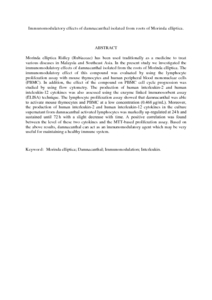Citation
Mohammed Alitheen, Noorjahan Banu and Ali, Abdul Manaf and Yeap, Swee Keong and Mustafa, Shuhaimi and L., Nordin and Abd Rahman, Mashitoh
(2010)
Immunomodulatory effects of damnacanthal isolated from roots of Morinda elliptica.
Pharmaceutical Biology, 48 (4).
pp. 446-452.
ISSN 1388-0209; ESSN: 1744-5116
Abstract
Morinda elliptica Ridley (Rubiaceae) has been used traditionally as a medicine to treat various diseases in Malaysia and Southeast Asia. In the present study we investigated the immunomodulatory effects of damnacanthal isolated from the roots of Morinda elliptica. The immunomodulatory effect of this compound was evaluated by using the lymphocyte proliferation assay with mouse thymocytes and human peripheral blood mononuclear cells (PBMC). In addition, the effect of the compound on PBMC cell cycle progression was studied by using flow cytometry. The production of human interleukin-2 and human inteleukin-12 cytokines was also assessed using the enzyme linked immunosorbent assay (ELISA) technique. The lymphocyte proliferation assay showed that damnacanthal was able to activate mouse thymocytes and PBMC at a low concentration (0.468 μg/mL). Moreover, the production of human interleukin-2 and human interleukin-12 cytokines in the culture supernatant from damnacanthal activated lymphocytes was markedly up-regulated at 24 h and sustained until 72 h with a slight decrease with time. A positive correlation was found between the level of these two cytokines and the MTT-based proliferation assay. Based on the above results, damnacanthal can act as an immunomodulatory agent which may be very useful for maintaining a healthy immune system.
Download File
![[img]](http://psasir.upm.edu.my/17710/1.hassmallThumbnailVersion/Immunomodulatory%20effects%20of%20damnacanthal%20isolated%20from%20roots%20of%20Morinda%20elliptica.pdf)  Preview |
|
PDF (Abstract)
Immunomodulatory effects of damnacanthal isolated from roots of Morinda elliptica.pdf
Download (181kB)
| Preview
|
|
Additional Metadata
Actions (login required)
 |
View Item |

